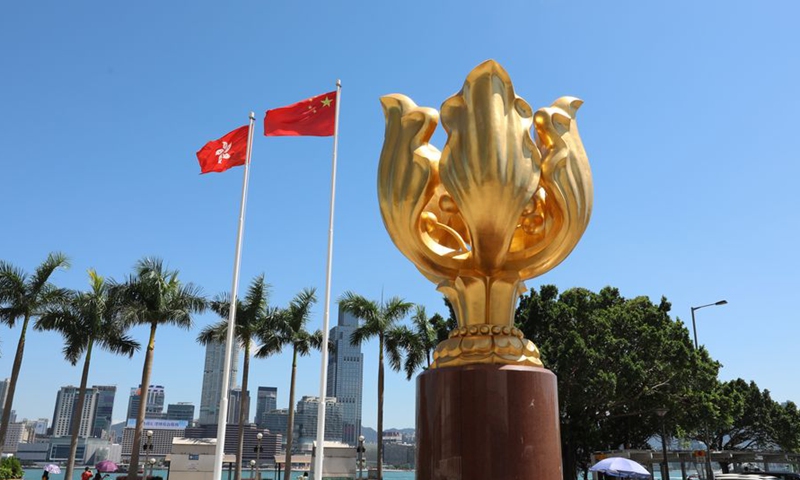
Photo:CFP
Shortly after the Legislative Council election in the Hong Kong Special Administrative Region (HKSAR) concluded on Monday morning with all 90 seats elected, the Chinese central government released a white paper on Monday titled Hong Kong Democratic Progress Under the Framework of One Country, Two Systems, which stresses that there is no question that the Communist Party of China (CPC) and the Chinese government designed, created, safeguarded and pushed forward Hong Kong's democratic system.
It was also the latest white paper on democracy issued by the Chinese government after the government published a white paper on China's whole-process people's democracy in early December and another white paper on US democracy exposing the deficiencies and abuse of democracy in the US, fully underscoring the true meaning of democracy, as it's also the urgent task for Hong Kong to rebuild its democratic path in line with its interests, bidding farewell to the collapsing Western style of democracy, observers said.
With six chapters, the white paper starts with the historical background of Hong Kong under the British colonial rule, when "there was no genuine democracy." For example, a governor was appointed to rule on behalf of Britain without the people of Hong Kong ever being consulted, whose powers and prerogatives were free of any checks and balances. Also at that time, the Executive Council and the Legislative Council (LegCo) were merely advisory bodies on decisions and lawmaking for the governor. Meanwhile, the British colonial government maintained a repressive rule in Hong Kong, tightly controlling the press and restricting freedom of speech.
Also, the British government repeatedly rejected all calls for democratic reforms in Hong Kong and its sudden interest in so-called electoral reforms at the end of the colonial rule revealed its ulterior motives of undermining China's sovereignty and full governance while extending British political influence after Hong Kong's return to China, according to the white paper.
Until now, some British politicians like Chris Patten, the last British Governor of Hong Kong, still point fingers at HKSAR's affairs by criticizing the Chinese government's policies on the city, reflecting a mentality of extending British influence over the Chinese territory, observers said.
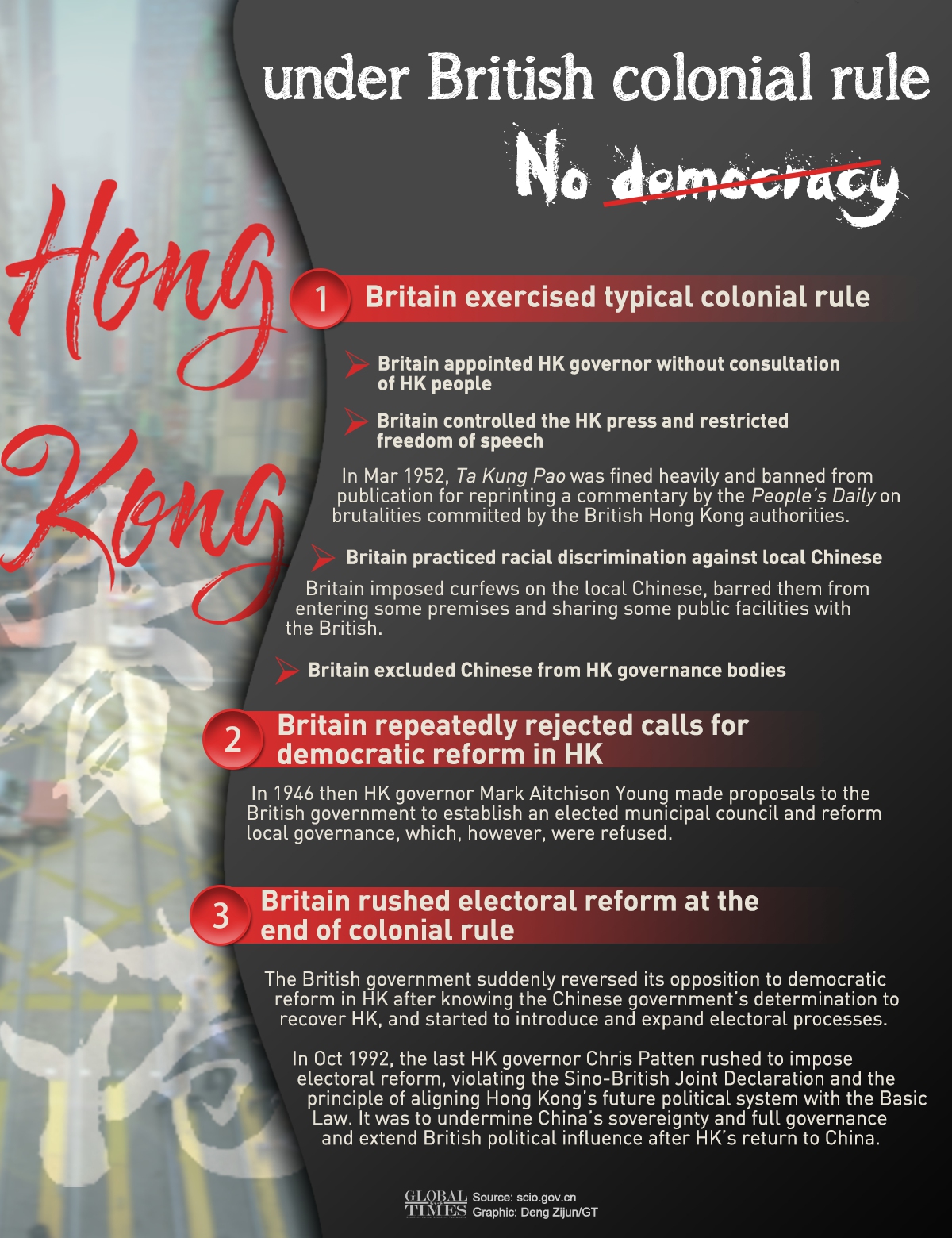
Hong Kong: No democracy under British colonial rule Graphic: Deng Zijun/GT
After Hong Kong's return to the motherland, the Constitution and the Basic Law established the system of democracy in the HKSAR, the white paper said. The Basic Law provides the core components of democracy in the city and the pathway and principles for its future development.
"The white paper traced back the essence of HKSAR's democracy by clarifying who granted Hong Kong people democratic rights. The British had never wanted to grant Hong Kong people democracy, and the real democracy was only developed after 1997," Zhi Zhenfeng, a legal expert at the Chinese Academy of Social Sciences in Beijing, told the Global Times.
The paper said the central government has made every effort to advance democracy in HKSAR and has taken three significant steps, including giving the approval to amend the election procedures for the Chief Executive and the LegCo, setting a timetable for universal suffrage and drawing up a roadmap for electing the Chief Executive by universal suffrage.
This was a new guideline on democracy in China issued after the government published a white paper on China's whole-process people's democracy in early December, elaborating in a comprehensive way, with details and examples, how the whole-process democracy with people's full participation in China works. Another white paper on US democracy exposes the deficiencies and abuse of democracy in the US and the harm of exporting such democratic model.
"This new report on Hong Kong's democracy was unveiled against the backdrop of a public debate between China and the US on democracy. Especially after the LegCo election was successfully held, the reformed system reflected the confidence and advantages of a much sustainable democracy defying the smear from the West against Hong Kong's electoral reform," Lau Siu-kai, Vice President of the Chinese Association of Hong Kong and Macao Studies, told the Global Times.
Some experts considered that Hong Kong has been going through a bumpy road in developing its democracy and the past experiences also showed that many problems emerged from the previous system. For example, the LegCo went against its primary initiative set by the Basic Law and deviated from the correct path, turning into a radical political wrestling stage on which some former lawmakers abused their power to oppose to the country and sabotage the rule of law.
China's struggle with antagonistic forces concerning the HKSAR is not about if we want or how to develop democracy, but about fighting secessionism, subversion and sabotage, which will help develop democracy in line with "one country, two systems," the Hong Kong and Macao Affairs Office of the State Council said in a statement issued after the white paper was published.
The anti-China forces destabilizing Hong Kong and their overseas supporters are the main culprits in obstructing and undermining the democratic development of Hong Kong, the top office on Hong Kong affairs said, noting that those forces distorted the essence of democracy, interfered with the democratic progress while trying to mislead the city's development of democracy into a wrong path and severely sabotaged an environment needed for the development of democracy.
Those agitators have misled public opinion by portraying Hong Kong as a sovereign country and they judge democracy as "true" or "fake" only by their own criteria, the white paper said. The 2019 social turmoil and chaos in the HKSAR also revealed shortcomings in the electoral system, the white paper said, noting that "development of democracy in any country should never come at the expense of national security."
"In the past, democracy in the HKSAR was ruined by anti-China riots from anti-establishment protesters and some anti-government political figures used the so-called Hong Kong democracy to weaken the 'one country, two systems' principle," Tian Feilong, associate professor at the Law Faculty of the Beihang University in Beijing and member of the Chinese Association of Hong Kong and Macao Studies, told the Global Times.
"It sabotaged Hong Kong's future development, which has also become a "chronic illness" over the past decades," Tian said, noting that "we must advance the reform to bring the city back to the right track through new paths.
The social turmoil in 2019 was a painful lesson for national security, the rule of law and social and economic stability in the HKSAR, the white paper said, noting that the central authorities issued a number of policies to bring the development of democracy in Hong Kong back on track, including the implementation of the national security law for Hong Kong, oath-taking rules for Hong Kong public servants and improvement of the electoral system with the principle of the city governed only by patriots.
"Hong Kong government is a regional government under the Chinese central government. The development of democracy in Hong Kong should be advanced through increasing the quality of the democracy practice instead of turning it into a bridgehead of engaging in anti-China rioting," Zhi said.
This white paper on the practice of democracy in Hong Kong will help the public further recognize the essence and truth of the city's democratic development, further shaping the consensus of advancing the practice of democracy in line with the "one country, two systems" principle and the Basic Law, the top office said on Monday.
In the eyes of some experts, the new electoral system in Hong Kong is another vivid example that the city won't blindly follow the Western model of democracy, but adopt the system that is in line with its historical background and current situation. "Especially that the city is an inseparable part of China, and must carry the 'one country, two systems,' so the local political system must play a positive role for its long-term political, economic, and social livelihoods development," Lau said.
Lau also noted that it would be within the expectation that the US refuses to recognize Hong Kong's political system as "Western style of democracy" but the city's democratic development will be in line with the fundamental interests of the Hong Kong people, which will achieve surprising results beyond the imagination of the Americans. "They will further understand that Western democracy does not represent common values," he said.
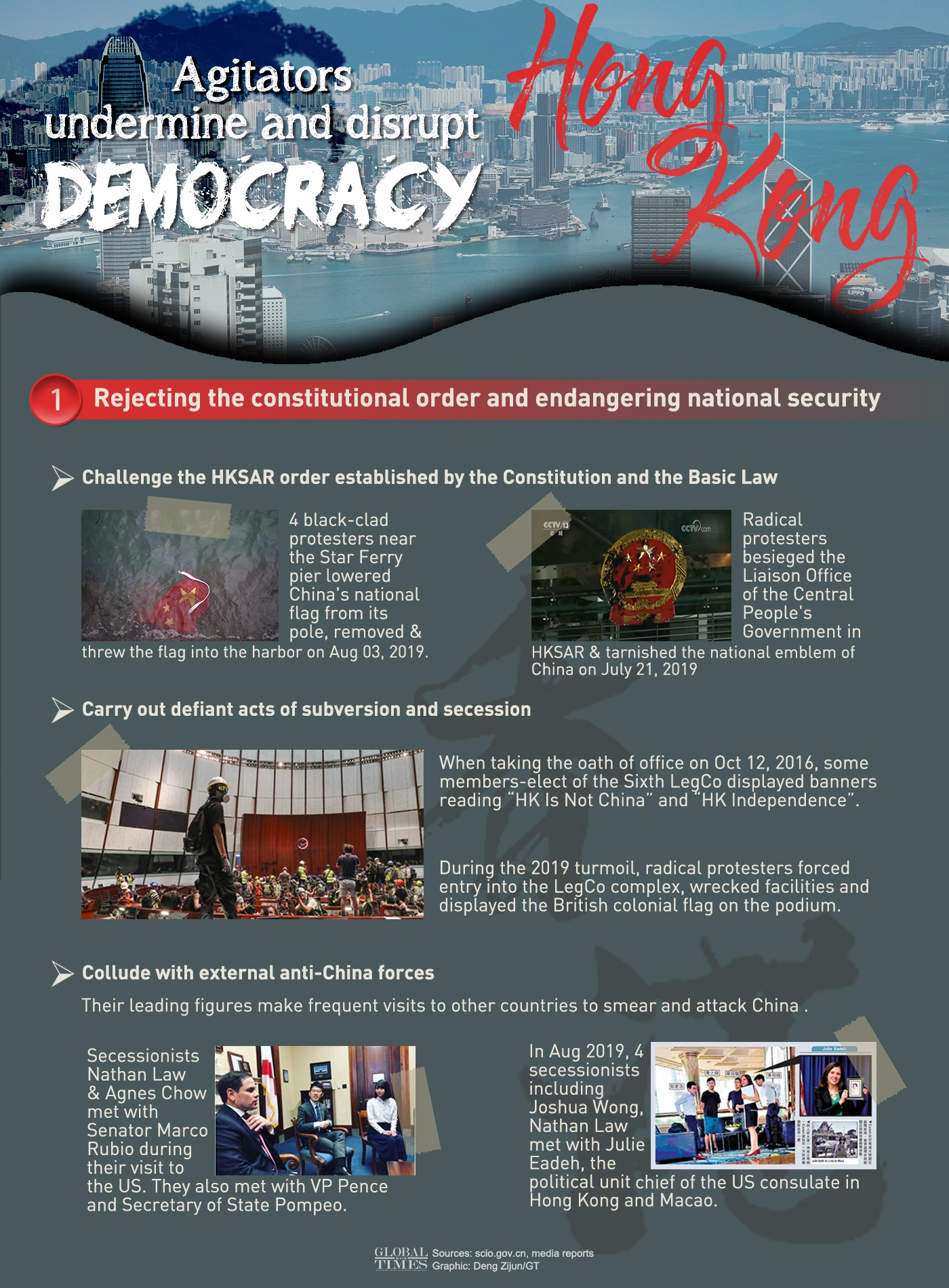
Agitators undermine and disrupt democracy in Hong Kong Graphic: Deng Zijun/GT
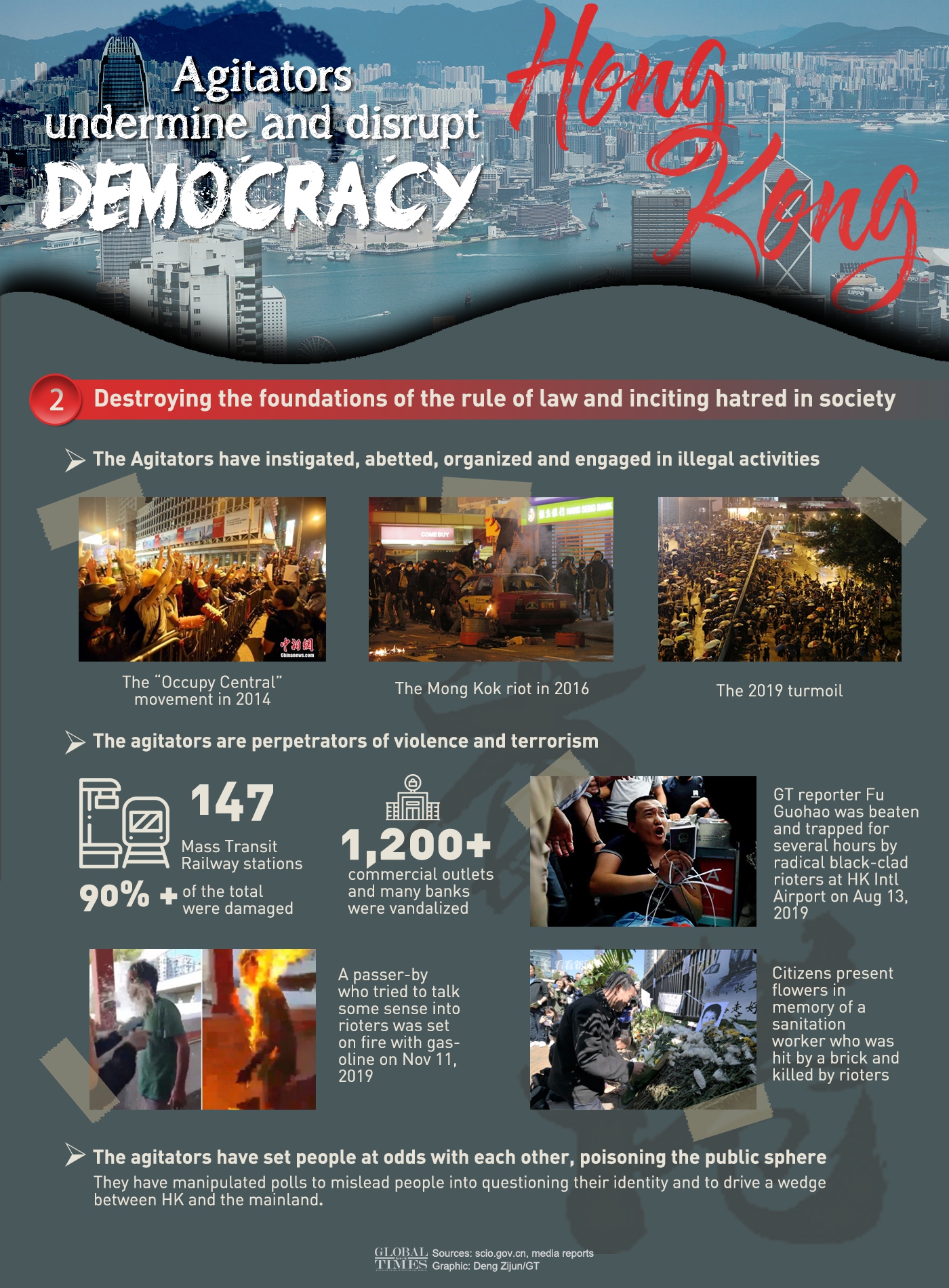
Agitators undermine and disrupt democracy in Hong Kong Graphic: Deng Zijun/GT
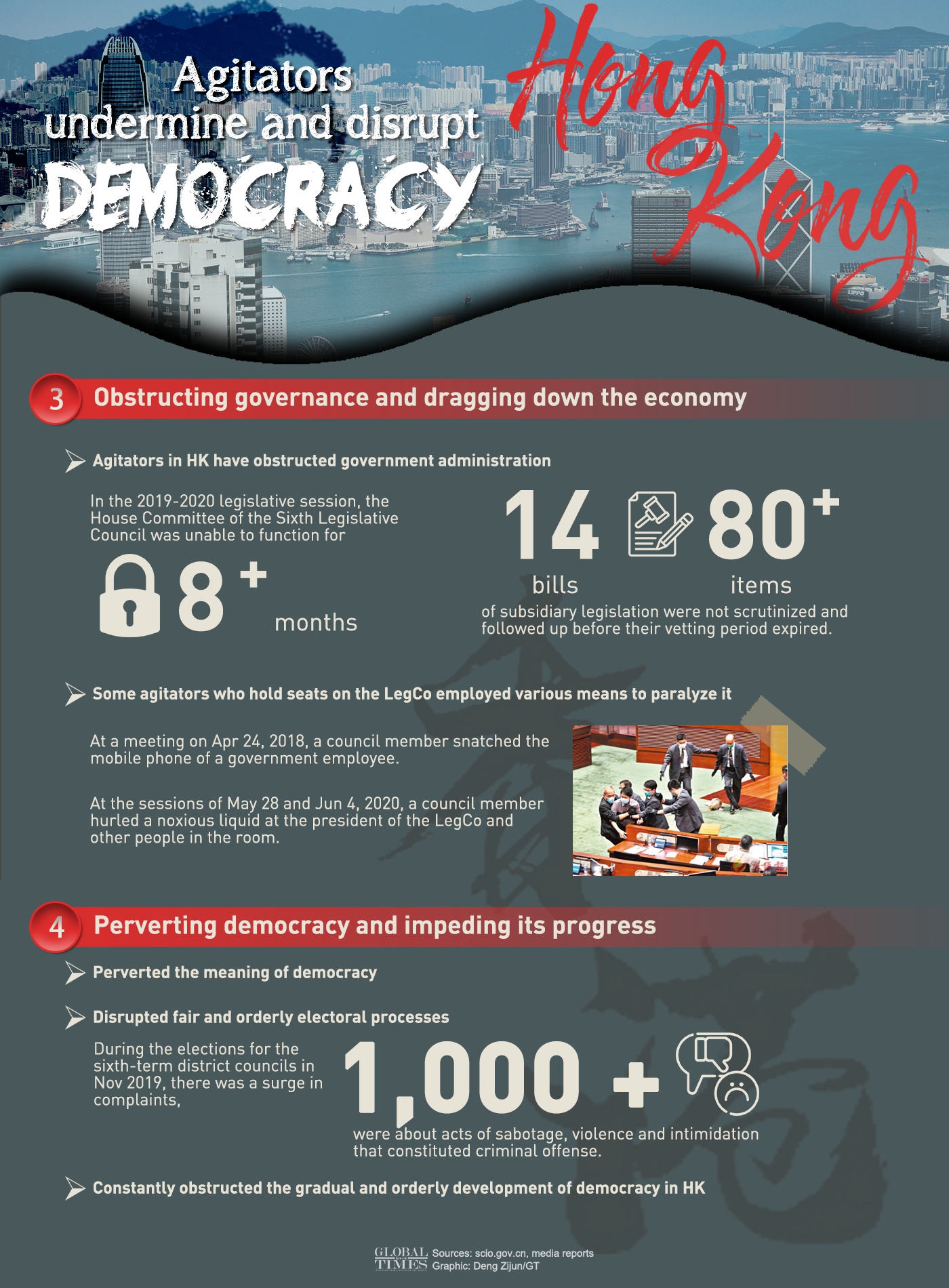
Agitators undermine and disrupt democracy in Hong Kong Graphic: Deng Zijun/GT


